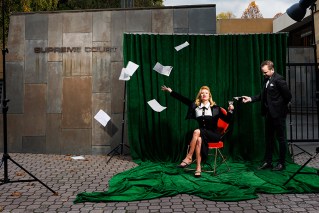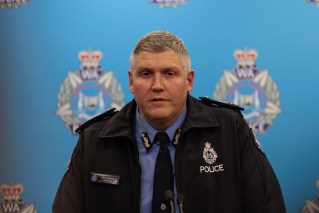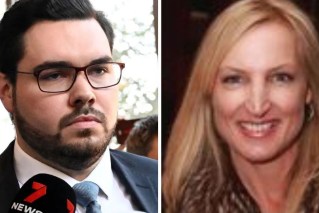A ‘broken’ Liberal Party enters Aston by-election as a feuding, fading rabble

Saturday’s Aston by-election looms as a yet another test of the Liberal Party’s increasingly fragile position in Australian politics, and for its leader Peter Dutton’s future political aspirations.
Labor are confident of a positive swing in the seat they lost by just 2.8 per cent of the vote at the 2022 federal election.
Labor candidate Mary Doyle is again contesting the seat on Saturday – this time against the Liberals’ Roshena Campbell, who replaces the outgoing and ever-controversial Alan Tudge.
The by-election comes amid the decline, of what some say, is the Liberal Party’s ability to form policy and even function as an Opposition fit for the modern world. This trend is explored below in an opinion piece by politics expert and Emeritus Professor Jenny Hocking.
*****
The Liberal Party is broken. Riven by ideological differences, petty personal feuds and bitter factional disputes, the party which once dominated the Australian political landscape so completely is today uncertain of what it stands for and incapable of working it out.
After suffering yet another electoral rout in NSW, which saw the sole mainland Liberal Party in government swept from office, the Liberals are in their worst political position since Kevin Rudd’s 2007 victory, after which every government, state and federal, was held by Labor.
And, while that electoral nadir was relatively short-lived, this one will not be.
These serial electoral disasters are just the most obvious manifestation of a deeper, more damaging, internal rupture that threatens the party’s very existence. The once unthinkable question must now be asked – can the Liberal Party survive?
Unprecedented losses
Labor’s consecutive electoral victories, particularly at the state level, have been unprecedented, and so too have the Liberal Party’s losses.
In Victoria, Labor secured its greatest margin yet under resilient third-term Premier, Daniel Andrews; Queensland’s Palaszczuk government is entering its ninth year in a state where Labor has held office for all but three of the past 25 years; the Liberal Party in Western Australia has been reduced to an unprecedented low of just two seats – insufficient even to form the Opposition party; and in the ACT a strong Labor-Greens alliance has governed for nearly two decades.
Tasmania remains the only Liberal strong-hold, and that on a margin of just one seat.

Anthony Albanese with Mary Doyle and Peter Dutton with Roshena Campbell. Photo: AAP
The figures are stark and yet there was no shortage of commentators and political relics determined to see this dire situation as the fault of “the right”, or “the left”, as equally a problem for ‘both major parties’ – spoiler alert, it isn’t – or even to see the NSW election as just ‘business as usual’, “a garden variety ‘It’s Time’ election” as one journalist described it.
It is anything but.
The increasingly distracted remarks of former prime minister John Howard, who immediately proclaimed the latest Liberal loss in NSW a “conventional change of government defeat” and predicted that Labor’s dominance wouldn’t last long – which is entirely to be expected from the architect of the party’s current malaise – give little hope of even a scintilla of political introspection to follow.
Crisis downplayed
Mr Howard’s trite attempt to downplay the severity of this crisis highlights the fact that the real danger the Liberal Party now faces is itself, in the blind refusal to acknowledge the depth of the problems it confronts.
The party is paralysed, consumed by factional in-fighting and internecine disputes and unable to reach sufficient consensus even to begin the process of policy development, modernisation and party renewal. This is more than just a failure of policy development, it is an absence of any policy development.
Although Mr Howard insistently denied that these results reflect the ‘drift of policy’ against Liberal conservatism, this says more about the irrelevance of Mr Howard’s frozen political vista than anything else.
The political reality, as every poll attests, of an identifiable shift in mainstream Australian politics to one which embraces action on climate change, an Indigenous Voice to Parliament, and against social and political extremism has no relevance to a party concerned more with its own factional outcomes and its ever diminishing ‘base’ than the interests of the Australian people.
If the Liberal Party cannot grasp that changed political dynamic and allow its policies and structures to evolve, to remain relevant to the electorate it is meant to serve, it cannot survive as a political force.
Driving policy change from Opposition is arduous, divisive, and sheer hard work. The gold standard in this will always be Gough Whitlam’s decade-long struggle, together with other “modernisers” in the Labor Party, to drag the party out of the residual ideological and personal hatreds of the post-split years and to make it relevant and electable again.
Against that back-drop of internal division and recrimination, not unlike that now engulfing the Liberals, Labor embarked on a highly contested, yet ultimately successful, wholesale rewriting of the policy platform during the 1960s ushering in new policies against racial discrimination, to end the White Australia policy and withdraw troops from Vietnam, introduce universal health care and racial discrimination laws, equal pay and free tertiary education.
These came among the scores of policy developments under Mr Whitlam’s leadership.
The resonance of Mr Whitlam’s successful 1972 “It’s Time” election campaign, and the more than one hundred specific promises set out in the policy speech, was only possible because of the years of policy development which preceded it.
Time to learn from Whitlam
The Labor Party had modernised its structures, membership base and platform, to underpin the program of the most reformist government in our history. For the Liberal Party to survive it must now do what every fibre in its political being demands it must never do – emulate Gough Whitlam!
Perhaps the kindest thing that can be said about Victorian Liberal leader, John Pesutto, is that this is what he was trying to do when he launched his bungled effort to expel the conservative member of the Victorian Legislative Council, Moira Deeming.
Mr Pesutto was uncompromising in his initial statement that he would move to expel Ms Deeming for “organising, promoting and attending” a Let Women Speak rally in Melbourne, gate-crashed by neo-Nazis outside the Victorian Parliament.
Ms Deeming’s failure to condemn the presence of Nazis, which had fuelled concerns of rising anti-trans sentiment against the LGBQTI+ community, was at the heart of Mr Pesutto’s insistence that her expulsion was essential in order to show that such views and actions had no place in the Victorian Liberal Party. Except they do.
Having failed in his effort to shift the party towards the centre, Mr Pesutto has only cemented the perception of the Liberal Party as a welcome haven for extreme conservatives such as Ms Deeming whose policy positions against abortion, COVID-vaccines and vaccine mandates had already seen her ruled too extreme to run in the last federal election.
Faction entrenched
The Victorian Liberal Party was not so concerned.
It is an indication of just how entrenched this faction is in Victoria that Mr Pesutto knew he had no hope of expelling Ms Deeming over her controversial policy stances; her presence at a rally attended by Nazis however was so odious and so widely condemned that it presented a rare opportunity for expulsion that was otherwise simply impossible.
On this, Mr Pesutto was quite adamant: “I will never, ever accept any member of the parliamentary Liberal Party under my leadership ever associating with anybody who shares a platform with people who peddle hate, division and attack people for who they are.”
This was as much a test of Mr Pesutto’s leadership as it was of Ms Deeming herself because Mr Pesutto, poorly advised and ill-prepared, made it so.
And yet even that attempt failed badly.
In trying to drag the Victorian Liberals into the centre by expelling one of the conservatives’ most prominent members, Mr Pesutto failed to ensure he had the full support he needed to carry it off.
Forget the spin that Mr Pesutto and his allies are valiantly putting on it, that failure was nothing short of disastrous for him, his leadership, and the future of his party.

MP Moira Deeming has been suspended by the Victorian Liberal Party for nine months. Photo: AAP
The headlines the following day said it all – Mr Pesutto “buckled under pressure”; did a “backflip”; his leadership “fatally wounded” – this was a dreadful own goal for a moderate leader determined to set the Liberal Party on a new path.
The “compromise” reached, which leaves Ms Deeming in the Liberal Party but outside the party room ‘suspended’ for the next nine months, was a fatal overruling of the leader by his own parliamentary party. This was a spectacular failure and its ramifications are severe.
Mr Pesutto is now, after only three months, already a leader on borrowed time. Having won the leadership by just one vote, and having staked everything on Ms Deeming’s expulsion, a challenge to his leadership is now inevitable.
And to round off a truly appalling few days for the besieged Liberals, a group of senior federal Liberal members including Andrew Hastie, Angus Taylor, Ted O’Brien, and former deputy speaker Llew O’Brien, injured a female Parliament house attendant while making a thoughtless, entitled and aggressive rush to leave the lower house chamber as the doors were being locked during a division. To say the optics looked bad wouldn’t even come close.
The only hope for the Liberal Party now is to embrace the 21st century, even the 20th century would be a start, and begin the long, hard process of policy renewal and modernisation. To do that it must first be prepared to acknowledge that it has a problem, and second, do something about it. At the moment it seems incapable of either.
Jenny Hocking is Emeritus Professor at Monash University, Distinguished Whitlam Fellow at the Whitlam Institute at Western Sydney University and award-winning biographer of Gough Whitlam. Her latest book is The Palace Letters: The Queen, the governor-general, and the plot to dismiss Gough Whitlam. You can follow Jenny on Twitter @palaceletters.
This article originally appeared on Pearls And Irritations.








